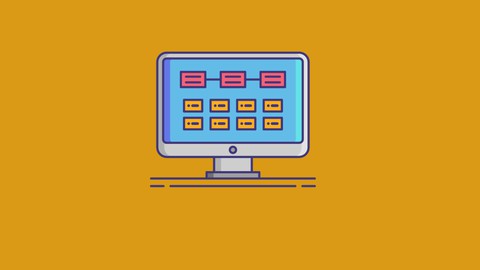
Express ( Web Framework) for beginners
Express ( Web Framework) for beginners, available at $39.99, has an average rating of 4.1, with 28 lectures, based on 35 reviews, and has 10310 subscribers.
You will learn about Installing Nodejs and Express Creating a basic express server Serving static content Basic Routing Testing Routes using Postman Setting Up Mongo DB Integrating MongoDB with Express This course is ideal for individuals who are Beginners to Express Framework It is particularly useful for Beginners to Express Framework.
Enroll now: Express ( Web Framework) for beginners
Summary
Title: Express ( Web Framework) for beginners
Price: $39.99
Average Rating: 4.1
Number of Lectures: 28
Number of Published Lectures: 28
Number of Curriculum Items: 28
Number of Published Curriculum Objects: 28
Original Price: $44.99
Quality Status: approved
Status: Live
What You Will Learn
- Installing Nodejs and Express
- Creating a basic express server
- Serving static content
- Basic Routing
- Testing Routes using Postman
- Setting Up Mongo DB
- Integrating MongoDB with Express
Who Should Attend
- Beginners to Express Framework
Target Audiences
- Beginners to Express Framework
Express is a popular unopinionated web framework, written in JavaScript and hosted within the Node.js runtime environment. This module explains some of the key benefits of the framework, how to set up your development environment and how to perform common web development and deployment tasks.
Node (or more formally Node.js) is an open-source, cross-platform runtime environment that allows developers to create all kinds of server-side tools and applications in JavaScript. The runtime is intended for use outside of a browser context (i.e. running directly on a computer or server OS)
Express is a fast, minimalist framework that sits on top of Node.js and allows you to build powerful single- and multi-page web applications and websites.
Express JS is built with Node JS and is a web framework that can help developers build faster and smarter websites and web apps. NodeJS is a server-side technology built using JavaScript. Express can also be integrated with other modules and databases and offers HTTP utilities and middleware for creating APIs.
This course will teach you the very basics in practical steps from installation to creating basic routes and using various http request and response status codes. You will learn how to use a useful tool called postman to test http request methods and also the response and status codes. We will also be learning how to install mongodb database and integrate it into our express app.
By the end of the course we would have created a basic functional express server integrated with a mongoDB database.
Topics include:
-
Installing Nodejs and Express
-
Creating a basic express server
-
Serving static content
-
Basic Routing
-
Testing Routes using Postman
-
Setting Up Mongo DB
-
Integrating MongoDB with Express
Course Curriculum
Chapter 1: Introduction and Setup
Lecture 1: Overview of express web framework
Lecture 2: Introduction
Lecture 3: What is Express
Lecture 4: What is Node.js
Lecture 5: Installing Node Js
Lecture 6: Updating Npm
Lecture 7: Installing Express
Lecture 8: Installing Atom
Chapter 2: Creating a basic Express Server
Lecture 1: Creating the main file
Lecture 2: Installing Nodemon
Lecture 3: Sending messages to the console
Lecture 4: Refactoring code
Lecture 5: Modules
Lecture 6: Middlewares
Lecture 7: Serving Static Content
Chapter 3: Basic Routing
Lecture 1: Introduction
Lecture 2: Defining basic routes
Lecture 3: What is Postman
Lecture 4: Testing routes using Postman
Lecture 5: What is HTTP
Lecture 6: Http Request Codes
Chapter 4: Integrating MongoDB with Express
Lecture 1: What is MongoDB
Lecture 2: Installing MongoDB on Windows
Lecture 3: Setting up environment variables
Lecture 4: Creating a storage directory for MongoDB
Lecture 5: Starting and Stopping MongoDB
Lecture 6: Integrating MongoDB with Express
Lecture 7: Thank You
Instructors
-
Bluelime Learning Solutions
Making Learning Simple
Rating Distribution
- 1 stars: 0 votes
- 2 stars: 2 votes
- 3 stars: 7 votes
- 4 stars: 14 votes
- 5 stars: 12 votes
Frequently Asked Questions
How long do I have access to the course materials?
You can view and review the lecture materials indefinitely, like an on-demand channel.
Can I take my courses with me wherever I go?
Definitely! If you have an internet connection, courses on Udemy are available on any device at any time. If you don’t have an internet connection, some instructors also let their students download course lectures. That’s up to the instructor though, so make sure you get on their good side!
You may also like
- Top 10 Video Editing Courses to Learn in November 2024
- Top 10 Music Production Courses to Learn in November 2024
- Top 10 Animation Courses to Learn in November 2024
- Top 10 Digital Illustration Courses to Learn in November 2024
- Top 10 Renewable Energy Courses to Learn in November 2024
- Top 10 Sustainable Living Courses to Learn in November 2024
- Top 10 Ethical AI Courses to Learn in November 2024
- Top 10 Cybersecurity Fundamentals Courses to Learn in November 2024
- Top 10 Smart Home Technology Courses to Learn in November 2024
- Top 10 Holistic Health Courses to Learn in November 2024
- Top 10 Nutrition And Diet Planning Courses to Learn in November 2024
- Top 10 Yoga Instruction Courses to Learn in November 2024
- Top 10 Stress Management Courses to Learn in November 2024
- Top 10 Mindfulness Meditation Courses to Learn in November 2024
- Top 10 Life Coaching Courses to Learn in November 2024
- Top 10 Career Development Courses to Learn in November 2024
- Top 10 Relationship Building Courses to Learn in November 2024
- Top 10 Parenting Skills Courses to Learn in November 2024
- Top 10 Home Improvement Courses to Learn in November 2024
- Top 10 Gardening Courses to Learn in November 2024






















